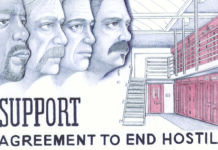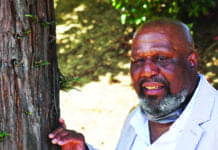
Join the San Quentin demonstration and vigil Saturday, Oct. 10, 4:30 p.m., at the Larkspur Ferry Terminal; see Facebook or Instagram: @NoJustice Under Capitalism
On Saturday, Oct. 10, a demonstration and vigil hosted by No Justice Under Capitalism, California Prison Focus and KAGE Universal (Kings & Queens Against Genocidal Environments) will take place at San Quentin Prison to celebrate the eighth anniversary of the Agreement to End Hostilities and recognize the ongoing history of prison resistance.
Demonstrators will assemble at the Larkspur Ferry Terminal parking lot at 4:30 p.m. and march up Sir Francis Drake Boulevard for an evening of education, arts and culture at the West Gate of San Quentin State Prison. The night will conclude with a candlelight vigil to honor and remember the people murdered at San Quentin and Attica in 1971 and the 69 incarcerated people in California prisons who died from COVID-19 due to Gov. Newsom and CDCR’s negligence during the pandemic.
On Aug. 21, 1971, Black revolutionary prisoner and best-selling author George Jackson was assassinated by guards at San Quentin two days before he was scheduled to go on trial in San Francisco with international press in attendance. The next day, incarcerated people in Attica Correctional Facility, who had been petitioning for changes in prison conditions for months, held a hunger strike in Jackson’s honor.
Donald Noble, one of the hunger strikers, said, “We noted that if people could come together for this, then they could come together for other things.” On Sept. 9, 1971, prisoners took control of a prison yard in Attica and presented demands for improved living conditions in what became the largest prison uprising in U.S. history. Four days later, Gov. Rockefeller ordered New York state police to brutally suppress the uprising, killing 33 prisoners and 10 correctional officers.
On Aug. 12, 2012, the leaders of the Pelican Bay Hunger Strike issued a statement calling for an end to all hostility and violence between different groups of prisoners across California prisons and jails starting on Oct. 10, 2012. The Agreement to End Hostilities was part of a campaign that mobilized over 30,000 incarcerated people in California to participate in the hunger strike in 2013.
The agreement emphasizes that it is only through unity and solidarity that prisoners can effectively fight important struggles such as an end to torture in the form of long-term solitary confinement. The hunger strikes helped put an end to indefinite solitary confinement, and the Agreement to End Hostilities united Black Guerrilla Family, Nuestra Familia, the Mexican Mafia and the Aryan Brotherhood in recognizing each other not as enemies, but rather as a prisoner class, subjected to the same dehumanizing oppression by the common enemy of the state.
This continued agreement has directly reduced racial hostilities in prisons and outside, as many non-incarcerated loved ones had become involved in the violence. As the agreement states in conclusion, “We can no longer allow CDCR to use us against each other for their benefit! Because the reality is that collectively, we are an empowered, mighty force, that can positively change this entire corrupt system into a system that actually benefits prisoners and, thereby, the public as a whole.”
The demands made by incarcerated people in the 1970s and by the hunger strikers in 2013 are based on the same principle: Recognize the dignity and human rights of all people in prison. Prison resistance remains an ongoing struggle, made all the more urgent when the crisis of COVID-19 in prisons continues to put lives at risk. Our main demand remains the same: Mass Releases Now and No State Execution by COVID-19!
Vigil planned to honor and remember the people murdered at San Quentin and Attica in 1971 and the 69 incarcerated people in California prisons who died from COVID-19.
The full demands for Oct. 10 are set out below, plus we embrace the call to establish a Strategic Community Release Board (SCRB) as stipulated within the Agreement 2 Come Home, drafted by principal thinkers of the California mass hunger strike, and the Agreement to End Hostilities inside and out.
This event is endorsed by All of Us Or None, Anti Police-Terror Project, Bay Resistance, California Coalition for Women Prisoners, Critical Resistance, Communities United for Restorative Youth Justice (CURYJ) and Legal Services for Prisoners with Children.
Demonstrators will observe social distancing guidelines and COVID-19 safety precautions.
California prisoners’ current demands
We demand that the California Department of Corrections and rehabilitation (CDCr) and Gov. Gavin Newsom grant mass releases and rehousing now, including to elderly, immune-compromised and trans incarcerated people in order to reduce the California prison population and protect incarcerated people, thousands of whom face a potential death sentence amidst the spread of COVID-19. Per UCSF public health experts’ recommendations, CDCr must reduce its current prison population by at least 50 percent.
We also demand that CDCr:
- Stop the transfers between prisons and to ICE detention centers
- Provide COVID-19 testing to 100 percent of the population and prison staff
- Limit exposed staff from working in areas with no known positive cases
- Provide nourishing and hot meals daily
- Ensure that there is no or minimal lapse in medications for those who need them, including hormones for trans people
- Expand credit-earning opportunities
- Provide free hygiene supplies and regularly disinfect all common areas
- Provide free tele-visiting privileges and stamps
- Expand free phone calls
During the wildfire season, we demand that CDCr:
- Be ready to transport prisoners by the time mandatory evacuation comes into effect
- Evacuate to sites in areas with virtually no fire risk
- Evacuate people with with necessary medical or assistive devices
Provide up-to-the-minute updates that families and loved ones can find on the internet, with information about what measures the prison is taking, when evacuation plans have been activated and where people are being taken
Pay incarcerated firefighters union scale wages and grant formerly incarcerated people the right to be hired despite felony convictions
We endorse the demands made by currently incarcerated people at San Quentin State Prison, and support the efforts of FUEL, CURB and CCWP to eliminate LWOP, terminate three strikes and end enhancements.
Wildfire season demands are based off those put forth by TGI Justice Project.

The Agreement 2 Come Home
The Agreement 2 Come Home includes five core demands based on the Prisoner Human Rights Movement Blueprint and developed in collaboration with its founders behind the walls. The following demands rely on the development of a Strategic Community Release Board, which needs to be at the forefront of all parole-related public safety decisions.
DEMAND #1. Any prisoner 60 or more years of age be considered for expedited release, immediately, by the SCRB in the interest of justice.
DEMAND #2. Any prisoner that has suffered an ailment that could lead to their death be considered for expedited release, immediately, by the SCRB in the interest of justice.
DEMAND #3. Any prisoner who has been incarcerated 25 to 30 years be considered for expedited release, immediately, by the SCRB in the interest of justice.
DEMAND #4. Any prisoner subjected to indefinite punishment based on rule violation reports, which are treated as felonies by the Board of Parole Hearings – who have suffered the consequences of this double jeopardy – be considered for expedited release, immediately, by the SCRB in the interest of justice.
DEMAND #5. An end to civil death by indeterminate sentencing (life sentences, with or without the possibility of parole). Indefinite sentencing is a punishment that never ends and leads to a civil death. This is a blatant violation of the U.S. Constitution, falling under cruel and unusual punishment. We demand that individuals with life sentences that meet any of the above four demands – especially those who have a solid parole plan, including a support system, adequate housing, and/or a job – be considered for expedited release, immediately, by the SCRB, in the interest of justice.

 Store
Store












